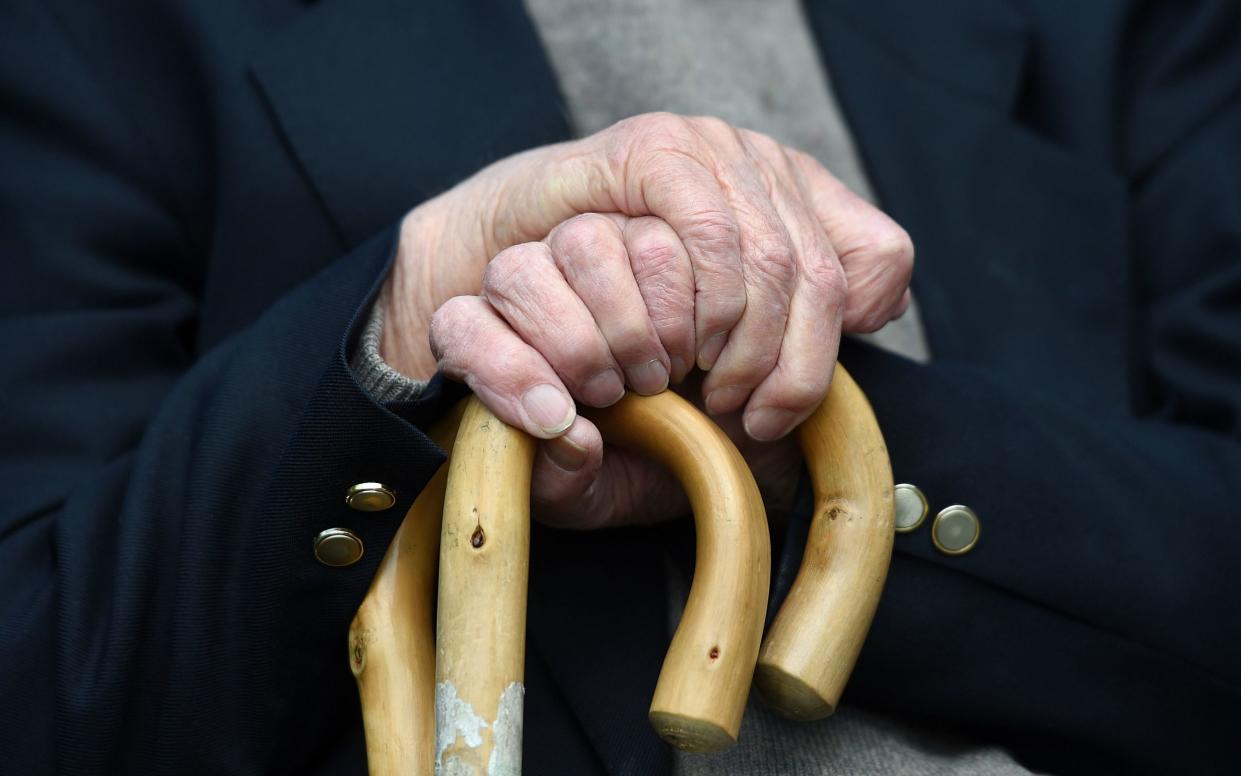Letters: The danger inherent in changing Britain’s laws on assisted dying

- Oops!Something went wrong.Please try again later.
SIR – I received a lung cancer diagnosis in March 2018. It came with the opinion that I was likely to “succumb” within nine months.
However, I was then offered a course of immunotherapy with a newly available drug. Now, more than five years down the line, I am 81 years old and living a full and healthy life.
Thank goodness for three things: the wonderful NHS, an amazing and dedicated oncology team at my local hospital, and the fact that Dignitas was not an option (“Call for Parliament to re-examine laws on assisted dying”, report, December 20).
Mike Cobb
London SW20
SIR – My father and sister died slowly with dementia; my mother was left in a vegetative state after a severe stroke; and my husband died in agony with cancer.
I wish to avoid such a fate, and would like to have the option of arranging for my own peaceful demise after my affairs have been settled. I am 87, have had a full life and would not want it to be extended simply because the state said so.
Mary Wiedman
Piccotts End, Hertfordshire
SIR – Dr Tim Howard (Letters, December 6), making the case for Britain to follow countries that have legalised “assisted dying”, claims that “we allow individuals complete autonomy over all other moral decisions in their lives”.
Not so. The law rightly disallows various autonomous decisions, from marrying one’s sister to having a healthy limb amputated to purchasing cocaine.
As Baroness Onora O’Neill has observed, legalising “assisted dying” would adopt a principle of indifference: “... in order to allow a few independent folk to get others to kill them on demand, we are to be indifferent to the fact that many less independent people would come under pressure to request the same.” Some choices, however autonomous, are bad for oneself and, if endorsed by law, dangerous to others.
Professor John Keown
Kennedy Institute of Ethics, Georgetown University
Washington DC, United States
SIR – After a stroke six years ago I have lost some use of my left arm and leg, and have to ask for help.
My wife of 55 years is wonderful with this; so are my children and grandchildren when they visit. It gives me a little insight into being totally needy.
If my situation changes, I do not want a doctor, a priest, a judge or a politician pontificating about it. The only people I trust to make a decision are my wife, my children and my adult grandchildren. These are the people I love, and I know that they would do the right thing.
David Martin
Little Baddow, Essex
Doctor strikes
SIR – It would be easier to sympathise with striking doctors (report, December 21) if we felt they were interested in taking control of their profession, focusing on patient care and giving taxpayers a fair return on their considerable investment.
All I see on their placards are pictures of Rishi Sunak and demands for higher salaries – no mention of the failures of the health system or the money squandered by bureaucrats, or criticism of NHS leadership.
Worse still, I can’t find a doctor who is striking because patients cannot get to see a GP, are on a long waiting list or have had operations cancelled. I’ve yet to hear from a young doctor who thinks the salary scheme should be adjusted so that juniors are paid better while consultants settle for slightly less than they know what to do with.
I truly wish to respect the medical profession but, at the moment, it just looks greedy and selfish.
Mark Rayner
Eastbourne, East Sussex
SIR – Junior doctors deserve a pay rise and taxpayers deserve value for money. The answer is to pay doctors more but also ensure they work for a prolonged period exclusively for the beleaguered NHS.
Bill Todd
Whitton, Middlesex
Israel’s rights record
SIR – The criticism of Israel by Olly Alexander, the BBC’s next Eurovision contestant, is staggering (report, December 21). His views are put forward as a member of the “queer community”. Israeli government policy may be far from perfect, but Mr Alexander and his BBC sponsors might take a moment to reflect on how this community is treated by Hamas and their backers in Iran.
Israel has led the way in promoting the acceptance of LGBT people in society (and specifically at Eurovision). A one-sided view of the distressing events in Israel and Gaza is sadly typical of trendy young people at present, who care little about the history and nuances of the region.
Dr Martin Shutkever
Pontefract, West Yorkshire
Spaniel support
SIR – The night after my wife died, my youngest cocker spaniel, Blue, decided to come and sleep on the floor at the side of my bed (Letters, December 18). This was a great comfort, and he has been there ever since. I’ve subsequently put a bed there for him.
Ashley Preston
Shipley, West Yorkshire
Yorkshire pud lottery
SIR – At the annual dinner for our badminton group, all those with a traditional Christmas dinner were given a Yorkshire pudding (Letters, December 21).
I had opted for the braised beef alternative, but strangely received no Yorkshire pudding.
Given our location, I wondered if this is a Norfolk phenomenon – or have other readers received unannounced Yorkshires with their Christmas dinners?
John Smith
Great Moulton, Norfolk
SIR – Peter Stevenson’s letter (December 21) on Christmas wreaths made from wine corks reminded me of a wreath I saw in the Lune Valley village of Hornby near Lancaster. It was made of used shotgun cartridges.
Paul Hutchence
Melksham, Wiltshire
Starmer’s legal career
SIR – You report (December 20) that Sir Keir Starmer, while at the bar, acted for some convicted prisoners who turned out to be entitled to be released from prison, along with the findings of “a trawl” of his cases.
Barristers are professionally obliged to accept properly remunerated cases within their competence and for which they are available. Our code of conduct expressly prohibits a barrister from declining a case because of the barrister’s opinion of the client.
We call this the cab-rank rule. This rule promotes access to justice and reflects the fact that the role of a lawyer is to advise and represent their client, not to judge their client. Judging is for judges or juries, not for us.
The idea that barristers (or, in Scotland, advocates) should somehow be associated with the causes of those whom they represent is therefore misconceived.
Nick Vineall KC
Chair of the Bar of England and Wales
Moira Smyth KC
Chair of the Bar of Northern Ireland
Roddy Dunlop KC
Dean of the Faculty of Advocates
SIR – Dame Priti Patel criticises Sir Keir Starmer for “helping to free serious criminals” from jail. The task of a defence counsel is to present the best possible case on behalf of his client. It is not his part to make any judgment about the guilt or otherwise of that client, for to do so would be to usurp the court’s function as the tribunal of fact. Moreover, given the cab-rank rule, there are very few grounds on which a barrister may decline to act.
One of the bravest counsel I know of was Emlyn Hooson QC, who defended the Moors Murderers, despite then being the Liberal MP for Montgomeryshire. No one criticised him at the time for discharging this duty. As an elected Conservative county councillor I hold no brief for Sir Keir, but criticism should address his espoused policies, not his legal career.
Tim Davies
Winchfield, Hampshire
Antisocial ovations
SIR – Standing ovations, which are increasingly frequent (report, December 21), do not necessarily represent the opinion of the majority.
At Covent Garden recently the person sitting in front of us stood up, obscuring our view. He and his rather large friend then refused to sit down, so we had no option but to stand as well – resulting in a mass standing ovation.
Richard Beaugie
Ashford, Kent
Labour’s threat to the English choral tradition

SIR – Jane Shilling’s article, “Declining music education is killing England’s choral tradition” (Comment, December 18), is highly pertinent. I am grateful that at the independent schools where I teach the piano, music education is still big business.
Indeed, for similar schools around the country, a thriving tradition of choirs, orchestras and instrumental lessons provides independent education with one of its principal attractions.
In a political atmosphere that often seeks to ignore or even denigrate our past historical and cultural achievements, independent schools continue to offer a facet of education that is increasingly rare in the state sector. As a result, I have often been puzzled by the propensity of many of my colleagues to lean ideologically to the Left, given that they rely on independent schools to provide them with a source of income.
I hope that the threat to the sector posed by an incoming Labour government will prompt a rethink. Many parents who choose independent schools for their children will make great efforts to continue to do so, despite the looming prospect of VAT on fees. I am, however, under no illusions: Labour could well seek to cut out the extras we provide, and music lessons will be the first to go. I wonder if Sir Keir Starmer, with his background in classical music, has considered the likely cultural ramifications of this flagship policy.
Matthew Woodward
Biggleswade, Bedfordshire
The cost of quadrupling the size of Cambridge
SIR – How can Michael Gove, the Housing Secretary, think that quadrupling the size of Cambridge is going to protect and preserve what makes this city special (report, December 20)? The two ideas are incompatible.
Perhaps the public would object less to new developments if they were not so soulless, ugly, low in quality and of such high density. Incorporating pavements and grass verges with trees, as builders did in the 1920s and 1930s, would help make them better environments to live in.
I suspect the quadrupling of Cambridge will not be matched by a quadrupling of amenities such as schools, doctors’ surgeries, hospital provision, parks, leisure centres and well-maintained roads. Yet without these, everyone’s quality of life will be diminished.
Rosemary Micklethwaite
Leeds, West Yorkshire
SIR – Politicians are silent on how local planning policies can and should influence the country’s drive towards net zero.
Even now, houses and industrial units are being built with no solar panels whatsoever, and without any major energy-saving devices besides insulation, which has figured in planning requirements for decades.
Robin SeQueira
Lytchett Minster, Dorset
Letters to the Editor
We accept letters by email and post. Please include name, address, work and home telephone numbers.
ADDRESS: 111 Buckingham Palace Road, London, SW1W 0DT
EMAIL: dtletters@telegraph.co.uk
FOLLOW: Telegraph Letters on Twitter @LettersDesk
NEWSLETTER: sign up to receive Letters to the Editor here

